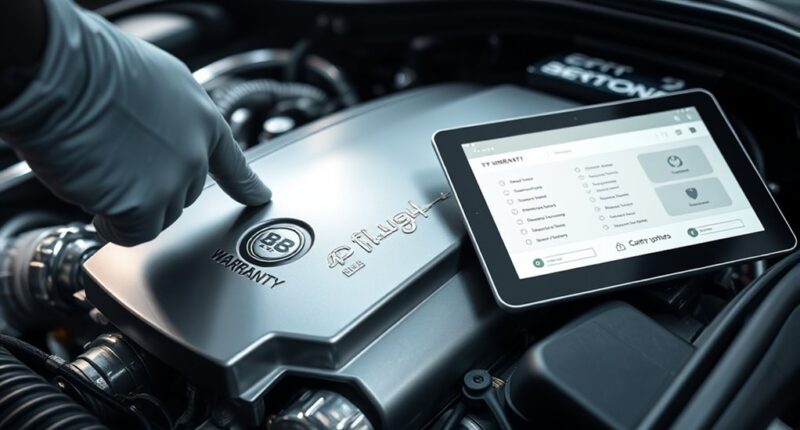When you tune your vehicle, you can boost performance by adjusting engine parameters like fuel delivery and boost pressure, but it may also void your warranty if detected. Manufacturers use digital signatures, checksum data, and special scan tools to identify modifications, which could lead to warranty denial if damage occurs. Using OEM parts and keeping detailed records can help protect your coverage. To learn how to balance tuning with warranty security, explore the key strategies ahead.
Key Takeaways
- Proper documentation and OEM parts can help protect warranty coverage when tuning your vehicle.
- Unauthorized aftermarket tunes or hardware may void your warranty, especially if damage occurs.
- Modern ECUs store digital signatures and checksum data, which can reveal prior tuning modifications.
- Consulting with reputable, warranty-friendly tuning services and dealerships reduces the risk of warranty voidance.
- Laws like the Magnuson-Moss Act limit warranty denial solely due to modifications unless directly causing damage.
How ECU Tuning Alters Vehicle Performance
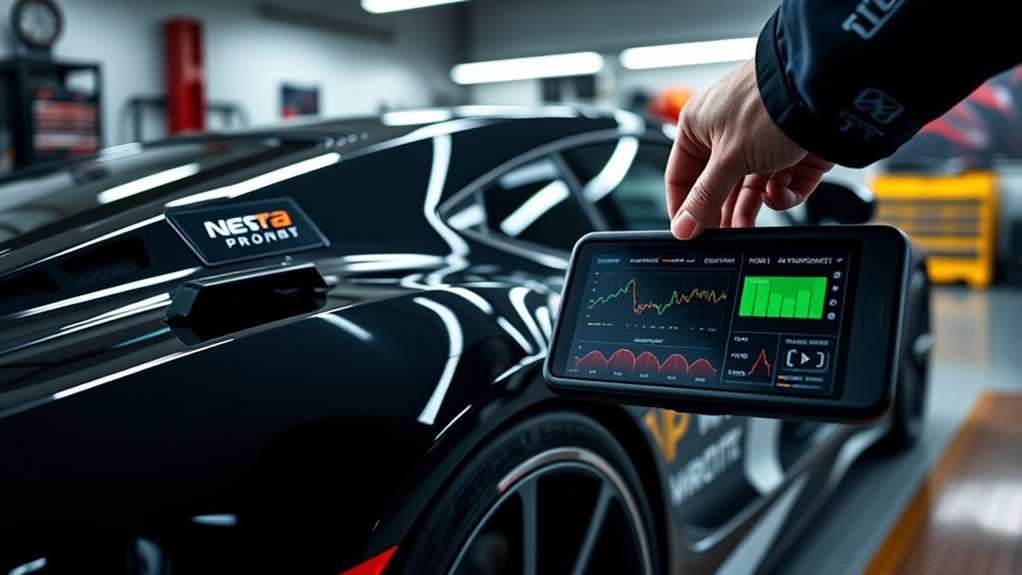
ECU tuning directly impacts your vehicle’s performance by adjusting key engine parameters like fuel delivery, boost pressure, and ignition timing. When you opt for ECU tuning, you’re essentially reprogramming the Engine Control Unit to access extra horsepower and torque, sometimes surpassing factory specs. This process can improve acceleration, throttle response, and overall driving experience while maintaining or even boosting fuel efficiency. Additionally, Mazda Tuning methods can be employed to customize your vehicle’s setup for specific driving needs or preferences. Proper ECU tuning can also enhance the vehicle’s performance potential by unlocking hidden capabilities that the manufacturer limits for stock models. As the automation in automotive industry advances, tuning techniques continue to evolve with sophisticated software tools. Moreover, advances in engine management systems enable more precise and safer tuning options. Proper tuning may also involve diagnostic tools that detect subtle changes in engine behavior, ensuring the tuning is both effective and safe. However, it’s important to note that altering the ECU leaves digital signatures that can be detected during diagnostic scans. While proper ECU tuning can optimize your engine’s performance, improper remapping risks engine stress, damage, or increased emissions. Additionally, modifying the ECU may affect your vehicle’s warranty, especially if the manufacturer detects the tuning during warranty claims.
The Legal Boundaries of Modifying Your Car
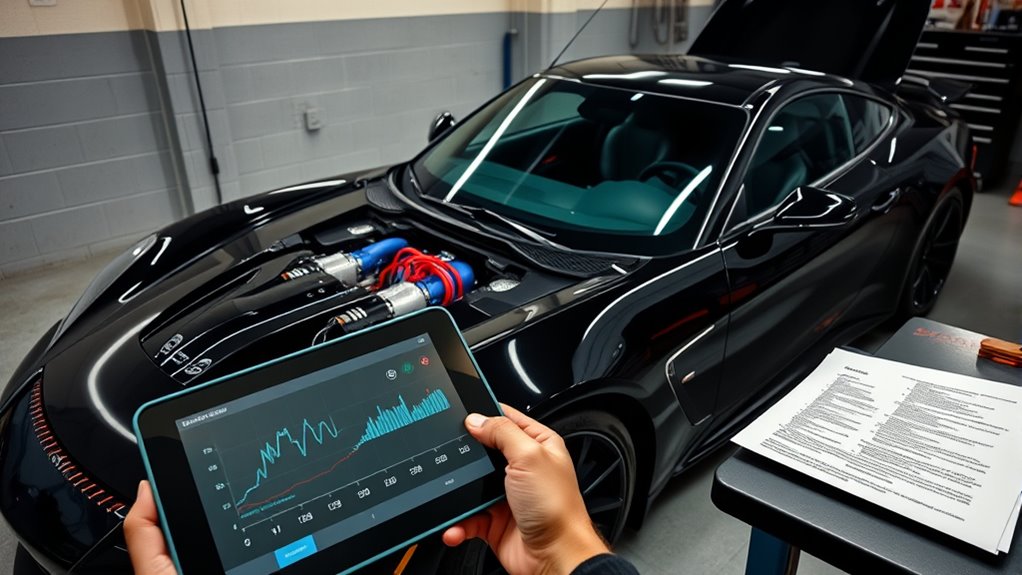
Modifying your vehicle can be legally complex, but understanding your rights is essential. The law, specifically the Magnuson-Moss Warranty Act of 1975, prevents manufacturers from voiding your warranty solely because of aftermarket modifications. They must prove a direct link between the modification and the failure to deny coverage. Many modern ECUs store digital signatures or checksum data, which dealers can scan during service to detect tuning or firmware changes. While aftermarket parts or software, like tuned ECUs, don’t automatically void the warranty, damage caused by these modifications can. You should keep detailed records to defend your warranty claims. Here’s a quick overview:
| Modification | Effect on Warranty |
|---|---|
| ECU Tuning | May not void warranty unless proven to cause damage |
| Aftermarket Parts | Usually won’t void warranty unless directly linked to failure |
| Digital Signatures | Detects modifications, but doesn’t automatically void warranty |
| Dealer Scans | Can reveal tuning, affecting warranty coverage |
| Proof & Documentation | Protects your warranty rights |
Additionally, understanding the software quality assurance practices involved in the development of vehicle control units can help you better navigate potential warranty issues related to firmware updates. Recognizing how digital signatures are employed in modern ECUs can assist you in understanding their role in warranty enforcement and potential defenses. Being aware of engine control unit security measures can further support your position when contesting warranty denials. Moreover, familiarity with appliance testing procedures can be beneficial if your vehicle relies on integrated appliances or electronic systems that require compliance checks. Staying informed about ECU remapping techniques and their detection methods can also empower you to protect your rights when modifying your vehicle.
How Manufacturers Detect and Respond to Tuning
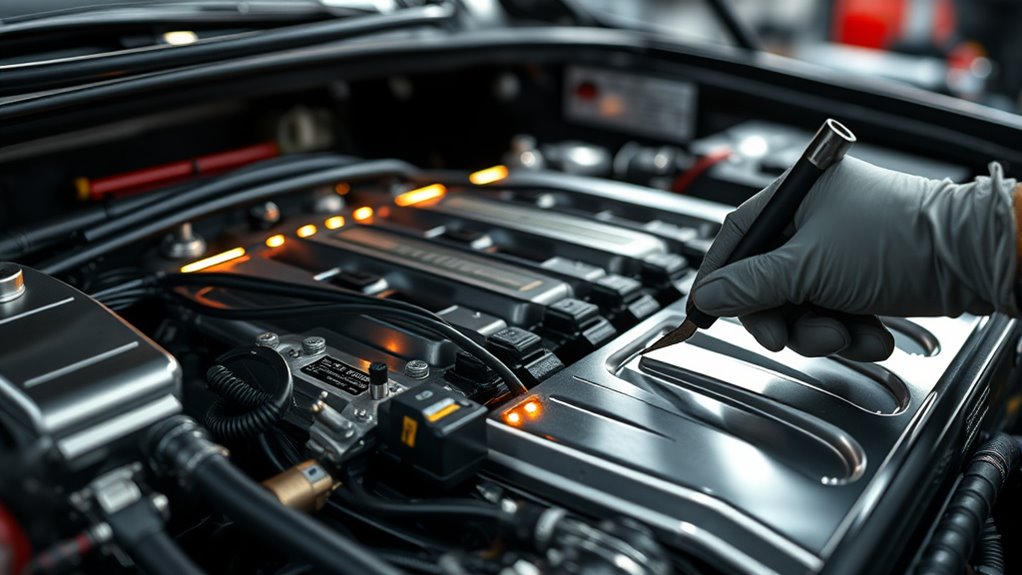
Manufacturers have multiple ways to detect tuning, such as ECU signature detection and diagnostic scan techniques. When you visit a dealership, technicians analyze logs, PCM data, and scan reports to spot any non-factory modifications. These methods make it increasingly difficult to hide tuning changes and can lead to warranty issues. Additionally, understanding the detection methods used by manufacturers helps consumers make informed decisions about modifications. The rise of cybersecurity vulnerabilities in connected vehicle systems underscores the importance of understanding vehicle security measures when considering modifications. Moreover, some manufacturers utilize specialized testing to identify tampering during routine service inspections. Incorporating advanced AI security tools in diagnostic processes can further enhance the detection of unauthorized tuning. Staying aware of evolving AI vulnerabilities in vehicle systems is crucial for both manufacturers and consumers to safeguard against potential security breaches.
ECU Signature Detection
When a vehicle is reprogrammed, its electronic control unit (ECU) leaves behind digital fingerprints that can reveal the tampering. Manufacturers use ecu signature detection to identify these clues, analyzing checksum data and firmware signatures that change during tuning. Modern ECUs often log software modifications with built-in flash counters, making it easier to detect tampering. During dealership scans, technicians employ specialized tools to spot anomalies or altered firmware versions. Even if you revert the ECU to stock settings, residual data like checksum changes can expose prior tuning attempts. Here’s a quick overview:
| Detection Method | What it Reveals |
|---|---|
| Firmware Signatures | Changes from original firmware |
| Flash Counters | Number of modifications |
| Checksum Data | Tampering or reprogramming |
Additionally, detection techniques are used to enhance the accuracy of identifying unauthorized tuning, which can lead to warranty denial. Manufacturers also utilize software analysis tools to compare firmware versions against manufacturer databases, increasing detection reliability. This process impacts warranty coverage, as manufacturers can deny service if tuning is detected. Furthermore, regulatory compliance measures are integrated into ECU detection techniques to ensure adherence to industry standards.
Diagnostic Scan Techniques
Diagnostic scan techniques rely on sophisticated tools that read and interpret ECU data to detect signs of tuning or tampering. These tools analyze the ECU checksum, which is altered when the ECU is reflashed or tuned, alerting technicians to modifications. Modern vehicles also store detailed logs, including firmware versions and flash counters, that help identify non-stock adjustments. During dealership visits, specialized software like Witech or ODIS scans the ECU for aftermarket parts or reprogramming indicators, revealing non-original signatures. Digital signatures and cryptographic hashes embedded within the ECU firmware serve as verification markers, and deviations from these signatures signal tampering. Additionally, real-time vehicle communication systems monitor parameters and record changes, making it increasingly difficult to conceal tuning during diagnostic scans. The use of detailed logs and real-time data enhances the ability to detect unauthorized modifications with greater accuracy, especially as manufacturers implement advanced security measures. Continuous improvements in diagnostic technology further bolster the detection of tampering. Moreover, ongoing advancements in vehicle security technology continue to improve detection capabilities, ensuring tampering is identified more reliably.
Protecting Your Warranty While Upgrading

Before upgrading your vehicle, review your warranty terms to see what modifications are allowed. Talk openly with your dealership to guarantee your plans won’t void coverage, and choose reversible tuning options when possible. Using OEM parts and keeping detailed records helps protect your warranty if questions arise. Additionally, understanding family dynamics and influences can be crucial when considering modifications that might affect your vehicle’s appeal or resale value. Being aware of cultural customs and local norms related to vehicle modifications can help you make informed decisions and avoid unintended issues. For support or questions about modifications, consider consulting PlayStation support hours or similar resources to ensure you’re informed about your options and any potential implications.
Understand Warranty Terms
Understanding your warranty terms is vital before making any upgrades, as it helps you avoid unintentionally voiding coverage. Carefully review your vehicle’s warranty documentation to spot clauses about modifications and aftermarket parts. Many manufacturers specify which types of upgrades, like OEM performance parts, won’t void your entire warranty. Knowing the difference between a warranty claim denied due to specific damage and one that could void your entire coverage is essential. If you plan to upgrade, communicate openly with your dealership to prevent misunderstandings. Keeping detailed records of all modifications, including parts and tuning procedures, can support your warranty claim if issues arise. Being informed ensures you protect your warranty and avoid costly surprises, giving you confidence during your tuning journey.
Communicate With Dealerships
Maintaining open communication with your dealership is essential when upgrading your vehicle, as it helps protect your warranty. By communicating with dealerships, you demonstrate transparency, which can prevent warranty claims from being denied. Always inform them of any planned modifications or tuning, and keep detailed records of aftermarket parts and software updates to show compliance with the manufacturer’s guidelines. Some dealerships offer in-house tuning or approved upgrades that preserve warranty coverage—be sure to consult them before making changes. Reverting your vehicle to stock settings before service can help avoid detection, but dealer scan tools may still reveal prior tuning. Remember, openly discussing your plans can build trust and ensure the manufacturer cannot deny warranty coverage due to unreported modifications.
Use Reversible Tuning Options
Using reversible tuning options is a smart way to enjoy performance improvements without risking your warranty. Reversible ECU tunes let you easily restore your vehicle to factory settings if needed, reducing the chance of warranty denial. Many reputable tuning companies offer custom tunes that can be backed out or reset to stock software before dealership visits, ensuring your vehicle remains compliant. Keep detailed documentation of your original software and any modifications to show dealers that your vehicle still adheres to warranty terms. Opting for OEM or manufacturer-approved tuning solutions also minimizes detection risks and warranty issues. Reversible tuning options provide flexibility, allowing you to enjoy enhanced performance while protecting your warranty. This approach ensures you get the best of both worlds—upgraded performance and peace of mind.
Common Risks Associated With Tuning
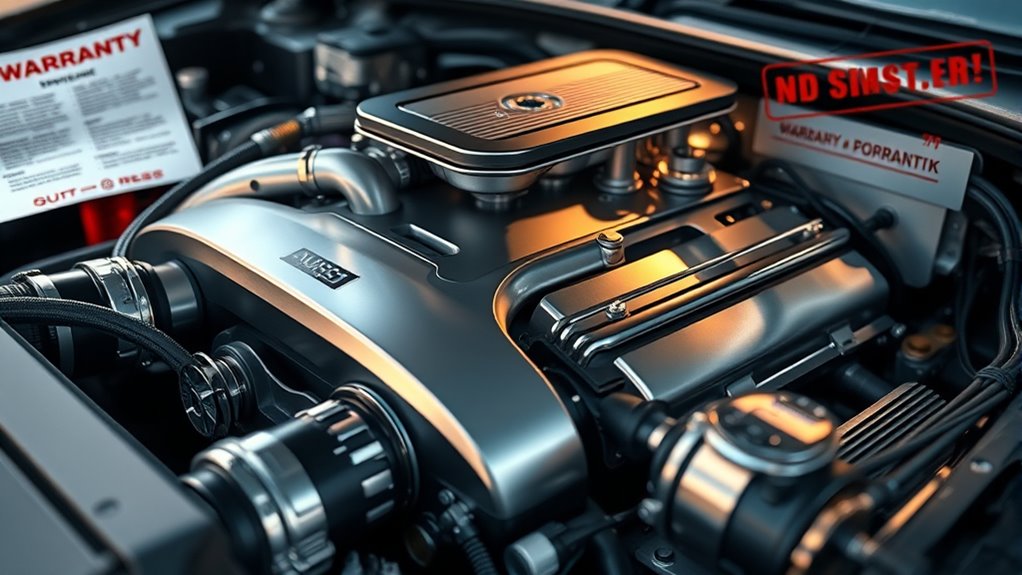
Tuning your vehicle can introduce several significant risks, especially related to your warranty coverage. If the manufacturer or dealer detects modifications linked to engine or transmission issues, your warranty could be at risk. Modern ECUs record digital signatures and checksum data, making it easier for technicians to identify tuning. This potential impact means warranty claims may be denied if tuning is suspected to cause damage. Keep in mind:
- Damage caused by tuning can void your warranty
- Reflashing the ECU might not hide modifications
- Advanced scan tools detect previous tuning changes
- Laws like the Magnuson-Moss Act limit warranty voidance unless a modification directly causes failure
Understanding these risks helps you weigh the benefits of tuning against your warranty protection.
Strategies for Warranty-Friendly Modifications

To make certain your modifications don’t jeopardize your warranty, start by carefully reviewing your vehicle’s warranty documentation to understand which upgrades are explicitly allowed and which could void coverage. Engaging in transparent communication with your dealer before installing aftermarket parts or software ensures you’re aware of their policies. Whenever possible, choose OEM or manufacturer-approved performance parts, as these are less likely to void your warranty. Working with reputable tuning services that follow warranty-friendly practices and provide documentation of their work can also help protect your coverage. Additionally, keep detailed records of all parts installed and procedures performed. This documentation can serve as valuable proof if warranty questions arise, helping you maintain coverage while customizing your vehicle effectively.
Real-World Examples of Tuning and Warranty Issues

Real-world examples highlight how aftermarket modifications can complicate warranty claims. For instance, a Jeep dealer denied warranty service after a Mopar cold air intake caused engine damage, showing how aftermarket parts can lead to claim denial. In another case, a Dodge Scat Pack experienced engine failure after a tune was removed, illustrating risks tied to tuning. Vehicle scans during service often reveal unauthorized modifications like tuned ECUs, which can result in warranty denial if detected. FCA’s systems can identify non-stock ECU software via checksum and digital signature analysis, making undetected tuning harder. Keep in mind that:
- Manufacturers can deny warranty coverage based on detected modifications
- Legal disputes over warranty claims can take years to resolve
- Warranty coverage may be voided if aftermarket parts cause damage
- Detection methods are increasingly sophisticated, reducing chances of concealed tuning
Balancing Performance Gains With Warranty Security

Achieving increased performance without risking your warranty requires careful planning and transparent communication with your dealership. Make sure your modifications follow manufacturer guidelines, as properly managed tuning can boost performance without automatically voiding the warranty, though detection methods may still flag changes. Many automakers reserve the right to deny warranty claims if a tune is linked to a failure, but under the Magnuson-Moss Act, aftermarket parts alone don’t necessarily void coverage unless they cause damage. Keep detailed records of all modifications and use OEM-approved parts when possible. Reputable tuning services that prioritize warranty-friendly practices can help you balance performance gains with warranty security. Remember, unapproved aftermarket tunes or hardware are more likely to jeopardize your warranty and risk voiding the warranty altogether.
Frequently Asked Questions
Does Tuning Affect the Warranty?
You might wonder if tuning affects your warranty. Generally, federal law says it doesn’t automatically void it unless the manufacturer proves the tune caused the failure. However, manufacturers can still deny claims if they link damage to your tuning or modifications. Modern vehicles log ECU changes, making it possible for them to detect tuning during service. To avoid issues, stick to manufacturer guidelines and consider reverting your ECU to stock before service.
What Information Is Needed for Warranty?
Think of your warranty like a delicate web—one loose thread can cause it to unravel. To keep it intact, you need to know what’s permitted and what’s not. Gather all relevant documentation, including receipts and installation dates for any modifications. Understand your manufacturer’s policies on ECU reprogramming and aftermarket parts. And always talk to your dealer before making upgrades; clear communication keeps your warranty’s safety net in place.
Will a Banks Tuner Void My Warranty?
You’re wondering if a Banks tuner will void your warranty. It depends. If the tuner is detected and linked to a repair or damage, your manufacturer could deny coverage. While federal law says aftermarket parts don’t automatically void warranties, manufacturers might record ECU modifications during service scans. To minimize risks, you can revert to stock settings, but traces might still be detectable, potentially affecting your warranty coverage.
Does an Exhaust Tune Void the Warranty?
Think of your warranty as a delicate web; one small tear can cause it to unravel. An exhaust tune by itself usually doesn’t void your warranty, unless it causes damage or failure linked to the modification. Manufacturers may check for aftermarket exhausts during service, but under the law, they can’t deny your warranty unless they prove the tune caused the issue. Be cautious, and keep records of your modifications.
Conclusion
Ultimately, understanding how tuning affects performance, knowing the legal limits, and protecting your warranty all come down to being informed, cautious, and strategic. By researching thoroughly, communicating openly with your manufacturer, and choosing modifications wisely, you can enjoy enhanced performance without risking your warranty. Stay aware, stay responsible, and balance your desire for power with your need for security. Because smart tuning is about maximizing gains while minimizing risks, ensuring your ride remains reliable and covered.
